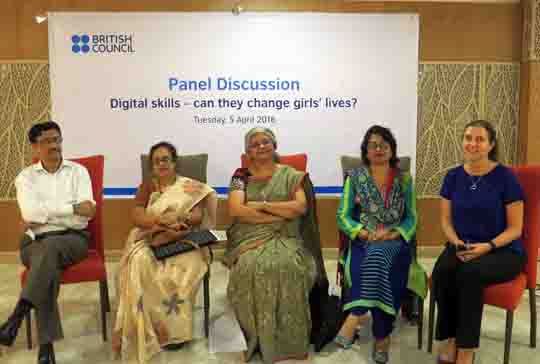The British Council very recently organised a panel discussion at Lakeshore Hotel. Titled ‘Digital Skills – Can They Change Girls’ Lives?’ the discussion considered disparity between men and women in terms of access to the internet and smartphone use in developing countries, and how accessing both can have a significantly positive impact on these economies.
Chowdhury Mufad Ahmed, Additional Secretary, Ministry of Education; Shahin Ahmed Chowdhury, Director General, Department of Women Affairs; Mahmuda Rahman Khan, Senior Program Development Specialist, USAID Bangladesh and Dr. Gitiara Nasreen, Professor, Gender, Media, and ICT Expert, University of Dhaka in the discussion as panelists. Gaynor  Evans, Head of English, British Council, moderated the discussion.
Evans, Head of English, British Council, moderated the discussion.
The panel addressed vital areas pertaining to the topic including the challenges that young women and girls face to gain relevant digital skills and the initiatives that are currently being taken to address and resolve the issue. It also considered how digital access can enhance economic empowerment and skill development of young girls, how young women and organisations can be encouraged to participate in the gender equality movement, how relevant policies and standards can be strengthened, and the role of governments and NGOs.
The World Bank in 2009 estimated that every 10% increase in access to broadband internet results in a 1.38% increase in GDP for low-income countries. In Bangladesh, men currently outnumber women by six to one in terms of access to the web and by two to one in terms of mobile phone ownership. The Intel report titled ‘Women and the Web’ published in 2013 noted that women across the developing world are 25% less likely to be online than men. If these women were to be brought online, this would contribute to an estimated US$13 bn to US$ 18 bn to annual GDP across 144 developing countries, including Bangladesh.
The various challenges that stand in the way of women to achieve this potential include a gender digital divide, which has led to a gender skill imbalance and unequal opportunities for women. This is compounded by the need to overcome social norms, the need to embrace opportunities that more accessible technology such as mobile phones can bring to women, and the need to work in multilateral partnerships to bring women in to the technology space.













